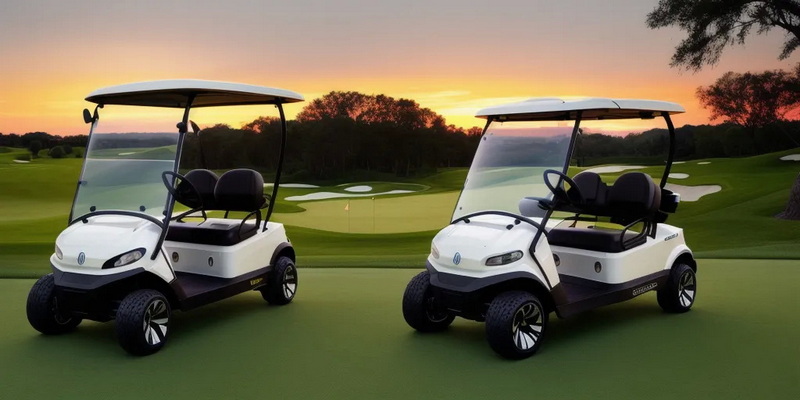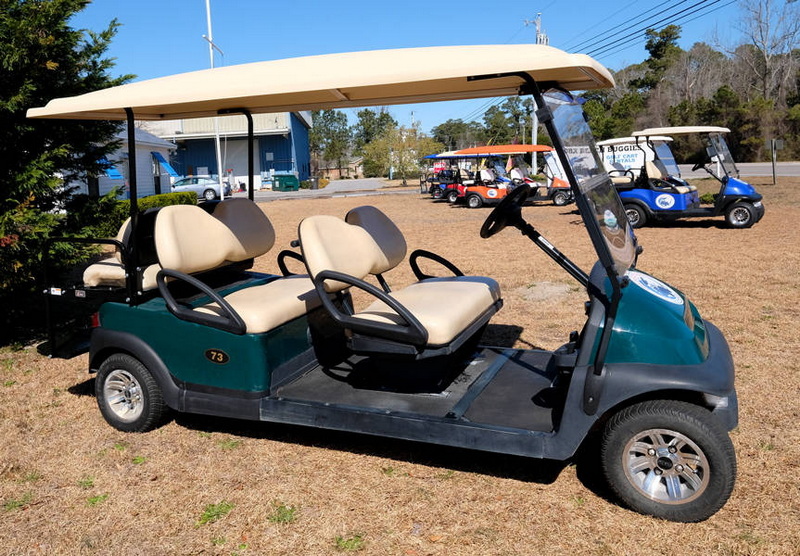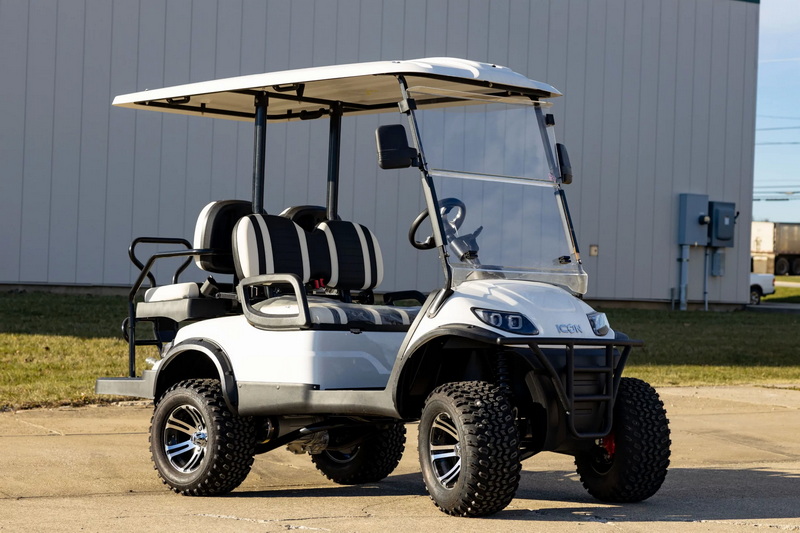Content Menu
● Understanding Electric Golf Cart Range
● Factors Affecting Electric Golf Cart Range
>> Battery Type and Capacity
>> Terrain and Course Conditions
>> Weight and Load
>> Driving Speed and Style
● Maximizing Your Electric Golf Cart's Range
● Advancements in Electric Golf Cart Technology
● Real-World Examples
● Environmental Impact
● The Future of Electric Golf Carts
● Comparing Electric and Gas Golf Carts
● Conclusion
● Frequently Asked Questions
>> 1. How long does it take to charge an electric golf cart?
>> 2. Can I increase the range of my electric golf cart?
>> 3. How does cold weather affect an electric golf cart's range?
>> 4. Are electric golf carts suitable for hilly terrain?
>> 5. How often should I replace the batteries in my electric golf cart?
Electric golf carts have become increasingly popular in recent years, not only on golf courses but also in various residential and recreational settings. One of the most common questions potential buyers and users ask is about the range of these vehicles. In this comprehensive guide, we'll explore the factors that influence the travel distance of electric golf carts and provide insights on how to maximize their range.

Understanding Electric Golf Cart Range
The distance an electric golf cart can travel on a single charge varies depending on several factors. On average, most electric golf carts can cover between 15 to 40 miles per charge. However, this range can be significantly affected by various elements, including battery type, terrain, and usage patterns.
Factors Affecting Electric Golf Cart Range
Battery Type and Capacity
The type and capacity of the battery are crucial in determining how far an electric golf cart can travel. There are two main types of batteries used in electric golf carts:
1. Lead-Acid Batteries: These are the most common and traditional battery type. They typically provide a range of 15 to 25 miles on a single charge.
2. Lithium-Ion Batteries: These are more modern and efficient. They can offer a range of 40 to 60 miles or more on a single charge.
Terrain and Course Conditions
The type of terrain on which the golf cart is driven significantly impacts its range. Flat surfaces allow for optimal energy efficiency, while hilly or rough terrain can drastically reduce the cart's range due to increased power consumption.
Weight and Load
The weight of the cart, including passengers and any additional cargo, affects the range. Heavier loads require more energy to move, thus reducing the overall distance the cart can travel on a single charge.
Driving Speed and Style
Consistent, moderate speeds are more efficient than frequent acceleration and deceleration. Aggressive driving styles can significantly reduce the cart's range.
Maximizing Your Electric Golf Cart's Range
To get the most out of your electric golf cart's battery, consider the following tips:
1. Maintain proper tire pressure
2. Avoid unnecessary weight
3. Drive at a steady, moderate speed
4. Plan your route to avoid steep inclines when possible
5. Keep the battery well-maintained and properly charged

Advancements in Electric Golf Cart Technology
Recent technological advancements have led to significant improvements in electric golf cart performance and range. Many modern carts now come equipped with:
- Regenerative braking systems
- Solar panel charging options
- Smart battery management systems
- Energy-efficient motors
These features contribute to extended range and improved overall performance.
Real-World Examples
Let's look at some real-world scenarios to better understand the range of electric golf carts:
1. Golf Course Use: On a typical 18-hole golf course, an electric cart can easily complete multiple rounds on a single charge, even with the added weight of golf bags and players.
2. Residential Communities: In gated communities or retirement villages, electric golf carts can often run for several days of regular use before requiring a recharge.
3. Campus Transportation: Universities and large corporate campuses using electric carts for transportation can typically operate throughout an entire day on a single charge.
Environmental Impact
The use of electric golf carts has a positive environmental impact compared to gas-powered alternatives. They produce zero emissions during operation and are significantly quieter, making them ideal for use in sensitive environments.
The Future of Electric Golf Carts
As battery technology continues to advance, we can expect to see electric golf carts with even greater range and efficiency in the future. Innovations in lightweight materials and energy management systems will likely push the boundaries of what's possible in terms of travel distance.
Comparing Electric and Gas Golf Carts
While this article focuses on electric golf carts, it's worth briefly comparing them to their gas-powered counterparts:
| Feature | Electric Golf Cart | Gas Golf Cart |
| Range | 15-60 miles per charge | 100-180 miles per tank |
| Fuel Cost | Lower (electricity) | Higher (gasoline) |
| Maintenance | Less frequent, simpler | More frequent, complex |
| Environmental Impact | Zero emissions | Produces emissions |
| Noise Level | Very quiet | Louder |
Conclusion
Electric golf carts have come a long way in terms of range and efficiency. While the average range of 15 to 40 miles per charge is sufficient for most applications, factors such as battery type, terrain, and driving habits can significantly impact this figure. By understanding these factors and implementing best practices, users can maximize their cart's range and enjoy the benefits of this eco-friendly transportation option.
As technology continues to advance, we can expect to see even more impressive ranges and performance from electric golf carts in the future. Whether you're using one on the golf course, in a residential community, or for commercial purposes, electric golf carts offer a reliable, efficient, and environmentally friendly mode of transportation.

Frequently Asked Questions
1. How long does it take to charge an electric golf cart?
Charging time for an electric golf cart typically ranges from 4 to 8 hours, depending on the battery type and charger efficiency. Lithium-ion batteries generally charge faster than lead-acid batteries. It's best to charge the cart after each use to maintain optimal battery health.
2. Can I increase the range of my electric golf cart?
Yes, you can increase the range of your electric golf cart by upgrading to higher capacity batteries, maintaining proper tire pressure, reducing unnecessary weight, and driving efficiently. Some users also install solar panels to supplement charging, especially for carts used in sunny locations.
3. How does cold weather affect an electric golf cart's range?
Cold weather can significantly reduce an electric golf cart's range. Battery efficiency decreases in low temperatures, which can result in a 20-50% reduction in range. To mitigate this, store your cart in a warm place when not in use and consider using battery warmers in extremely cold climates.
4. Are electric golf carts suitable for hilly terrain?
Electric golf carts can handle hilly terrain, but it will reduce their overall range. Modern carts often come with more powerful motors and advanced battery management systems that help maintain performance on inclines. However, for consistently hilly areas, you may want to consider a higher-powered model or one with lithium-ion batteries for better performance.
5. How often should I replace the batteries in my electric golf cart?
The lifespan of golf cart batteries varies depending on usage and maintenance. Lead-acid batteries typically last 3-5 years with proper care, while lithium-ion batteries can last 7-10 years or more. Regular maintenance, proper charging habits, and avoiding deep discharges can help extend battery life.










































